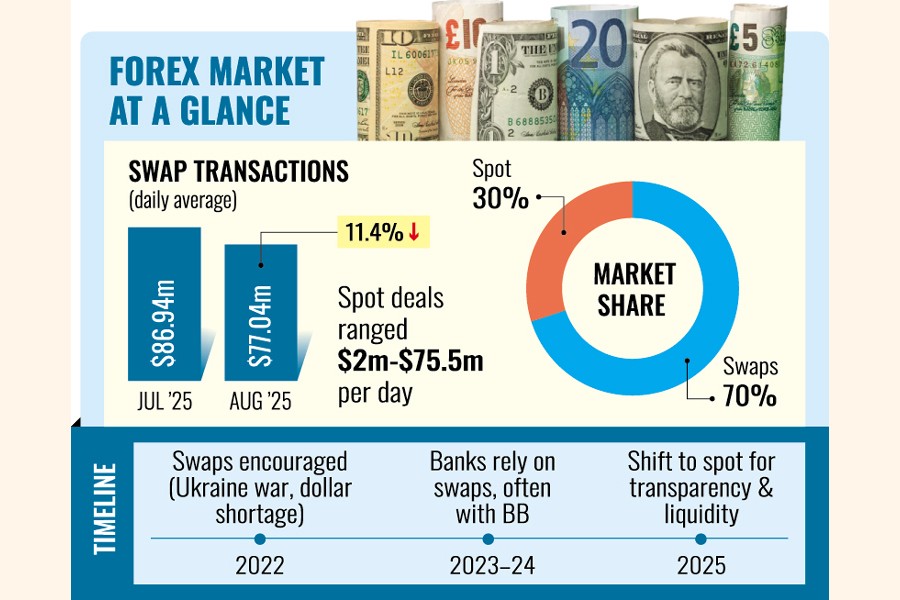
Published :
Updated :

Foreign-exchange swap transactions on the interbank market dropped in August compared with the previous month, even as the Bangladesh Bank pressed ahead with its strategy to promote spot-market trading over swaps.
The move is intended to make the market more transparent and reflective of real demand-and-supply conditions.
Bankers, however, say the fall in swaps is largely the result of the central bank's own intervention, as it purchased US dollars directly from the market.
Despite the decline, swaps still accounted for the lion's share of interbank forex activity in August.
Commercial bank executives, however, argue that the decline was driven by the central bank's purchases of US dollars from the market.
Bangladesh Bank data show that the average daily swap transaction stood at US$77.04 million in August 2025, down from $86.94 million in July. Despite the fall, swaps still accounted for nearly 70 per cent of interbank forex transactions.
A currency swap is a short-term contract between two parties, typically banks, where one borrows foreign currency, such as US dollars, in exchange for local currency, with an agreement to reverse the deal later at a set interest rate. Banks frequently use swaps to manage short-term dollar shortages.
Spot transactions also edged lower in August as exchange rate volatility eased, though daily activity fluctuated widely.
Spot dollar deals ranged from $2.0 million to $75.5 million per day, while non-dollar transactions were minimal. Euro-Taka trades took place on only four business days during the month, amounting to just $2.88 million in total.
Central bankers argue that spot trading better reflects market fundamentals than swaps.
"This is a market-based system, while swaps do not provide the true picture of supply and demand," a senior official said, adding that the regulator now uses spot trades as a benchmark for setting daily exchange rates.
During the tenure of former governor Abdur Rouf Talukder, the central bank encouraged swaps to ease the severe dollar shortage triggered by the Ukraine war in 2022, when many banks relied on such arrangements, often with the regulator itself.
That policy has since shifted, with Bangladesh Bank prioritising spot trades in an effort to deepen liquidity and enhance transparency.
A treasury head at a leading commercial bank told the Financial Express that surplus foreign exchange tends to dry up once the central bank intervenes in the market.
"As Bangladesh Bank has been buying dollars from the market, the volume of swaps has fallen," he said.
jasimharoon@yahoo.com


 For all latest news, follow The Financial Express Google News channel.
For all latest news, follow The Financial Express Google News channel.